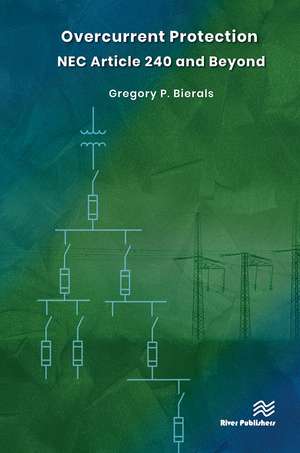Overcurrent Protection NEC Article 240 and Beyond
Autor Gregory P. Bieralsen Limba Engleză Paperback – 21 oct 2024
A short-circuit may be hundreds or even thousands of times above the normal operating current. This type of fault may be an arcing fault between ungrounded conductors or between an ungrounded conductor and a grounded (usually, a neutral) conductor, a line-to-line arcing fault may produce a current of 74% of a 3-phase bolted fault. A line-to-neutral arcing fault will be somewhat less.
A line-to-line bolted fault, the equivalent, of the conductors bolted together, may be up to 100% of the available short-circuit current.
A line-to-neutral bolted fault may be in excess of 100% of the 3-phase bolted fault at the source, but considerably less downstream.
A ground-fault, that is, the equivalent of a connection between an ungrounded conductor and the equipment grounding system, will produce a current that may be 38% or higher of the 3-phase bolted fault current. These types of faults are typically arcing faults which normally are intermittent in nature. That is, they strike and restrike over time and may produce a short-circuit fault due to insulation damage.
Once again, a line-to-equipment ground fault near the source may produce a fault current of over 100% of the 3-phase bolted fault, but considerably less downstream.
An overload typically ranges from one to six times the normal current, and are normally caused by motor starting currents or transformer magnetizing currents. These conditions are of such short duration that the circuit components are not damaged.
This book has a detailed analysis of these types of faults, along with explanations and examples of the various types of overcurrent protective devices to assure proper protection.
This volume has extensive information on the application of overcurrent protection for conductors and equipment. The reader will be able to calculate fault currents as well as establishing the short-circuit withstand rating of conductor insulation and to determine the appropriate type of overcurrent devices based on circuit conditions.
In addition, determining ground-fault currents for the purpose of selecting the proper size of equipment grounding conductors to establish an effective ground-fault current path is discussed in detail.
Readership - Anyone involved with the design of overcurrent protection for electrical distribution systems from the system source to the electrical utilization equipment. The emphasis is placed on the design of the overcurrent protection for specific installations to assure proper protection for the circuit components regardless of the type of fault encountered.
| Toate formatele și edițiile | Preț | Express |
|---|---|---|
| Paperback (1) | 331.38 lei 6-8 săpt. | |
| River Publishers – 21 oct 2024 | 331.38 lei 6-8 săpt. | |
| Hardback (1) | 554.88 lei 6-8 săpt. | |
| River Publishers – 23 dec 2021 | 554.88 lei 6-8 săpt. |
Preț: 331.38 lei
Nou
Puncte Express: 497
Preț estimativ în valută:
63.42€ • 65.71$ • 52.93£
63.42€ • 65.71$ • 52.93£
Carte tipărită la comandă
Livrare economică 21 martie-04 aprilie
Preluare comenzi: 021 569.72.76
Specificații
ISBN-13: 9788770042826
ISBN-10: 8770042829
Pagini: 110
Dimensiuni: 156 x 234 mm
Greutate: 0.2 kg
Ediția:1
Editura: River Publishers
Colecția River Publishers
ISBN-10: 8770042829
Pagini: 110
Dimensiuni: 156 x 234 mm
Greutate: 0.2 kg
Ediția:1
Editura: River Publishers
Colecția River Publishers
Public țintă
AcademicCuprins
1. Definitions 2. Overcurrent Protection-Over 1000 Volts 3. Motor Circuits 4. Selective Coordination 5. A Comprehensive Analysis of A 3-Phase, 4-Wire Distribution System; Overcurrent Protection; Answer key
Notă biografică
Gregory P. Bierals, President, Electrical Design Institute, LLC-has presented seminars worldwide on various topics including the National Electrical Code, Grounding Electrical Distribution Systems, Designing Overcurrent Protection, Electrical Equipment Maintenance, and Designing Electrical Systems for Hazardous (Classified) Locations. He has maintained an extensive client list during the past 45 years, and he has earned the reputation of being an extraordinary lecturer as a result of his organization of materials and knowledge of this subject.
Descriere
This book has a detailed analysis of several types of faults, along with explanations and examples of the various types of overcurrent protective devices to assure proper protection. This volume has extensive information on the application of overcurrent protection for conductors and equipment.
